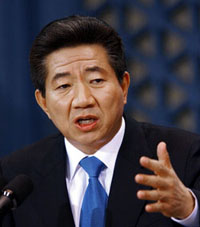NKorea wants to improve ties with US

North Korea wants to set better relationships with the U.S. that is why it hurries up to resolve the international standoff over its nuclear weapons program, South Korean President Roh Moo-hyun said Friday.
Roh made the remark while briefing foreign media on his rare talks with North Korean leader Kim Jong Il earlier this month, which produced a wide-ranging agreement on bringing greater peace and expanding economic cooperation on their divided peninsula.
"The reason North Korea is trying to solve the North Korean nuclear question is to improve relations with the United States," Roh told reporters from selected foreign media organizations, including The Associated Press.
It was unclear, however, if Roh's statement was based on Kim's direct words or the president's own view of the situation. Roh did not elaborate, and no follow-up questions were allowed in the news conference.
Some North Korea analysts had speculated that Kim might try to convey to the U.S. his seriousness about resolving the nuclear issue through Roh.
North Korea has been increasingly compliant in international talks to get rid of its nuclear program since the U.S. significantly softened its approach toward Pyongyang after the communist regime conducted its first-ever nuclear test last October.
The North agreed in February to shut down its sole functioning nuclear reactor and disable it in exchange for economic aid and political concessions from its negotiating counterparts - the United States, China, Japan, South Korea and Russia.
Pyongyang closed the Yongbyon reactor in July and recently committed to disabling it by year's end. Earlier this week, a team of U.S. experts wrapped up a weeklong trip to the North aimed at mapping out a disablement plan.
After the summit with Kim, Roh has faced criticism that he did not deal sufficiently with the nuclear issue as their agreement cited the matter in a single sentence, saying the two sides would try to ensure the "smooth implementation" of previous nuclear accords.
Roh has repeatedly said that Kim demonstrated a clear commitment to resolving the standoff during the summit talks, and that he felt no need to seriously raise the matter as it is firmly on track toward resolution.
This month's summit was only the second between the two Koreas since the peninsula was divided more than half a century ago in the aftermath of World War II.
The first summit, in 2000, touched off a flurry of exchanges between the two sides - who are still technically in a state of conflict, because the armistice ending the 1950-53 Korean War was never replaced by a peace treaty.
One key point in the summit declaration was that Roh and Kim agreed on seeking to formally end the war and to organize a three-way or four-way summit of related countries to discuss the issue.
Roh said the ambiguity about the format was because China, also a party to the armistice, had not explicitly expressed its interest in forging a peace treaty.
Now that Beijing has made clear such an intention after the inter-Korean summit, Roh said the peace talks would be a four-way meeting also involving the two Koreas and the U.S.
After North Korea invaded the South on June 25, 1950, the U.S. led a multinational United Nations force against the Chinese-backed North Korea.
Roh also rejected criticism that the summit agreement, which included pledges to increase inter-Korean economic cooperation, would put a huge financial burden on South Korea.
He said most of the projects would be funded by the private sector and be based on business considerations, though he added that some, such as improving a key North Korean highway, would require state funding.
"North Korea is not a land of danger, but a land of opportunity for us," he said.
Roh also said that he does not believe that impoverished North Korea would collapse, and that the South would therefore not be forced to absorb the communist nation at great cost, as in the case of the formerly divided Germany.
Roh also said it would be "unrealistic" to demand that North Korea apologize for starting the war. Some conservative groups have said such an apology should precede a peace treaty.
North Korea has never admitted that it started the war, claiming rather that it was invaded by the South.
Subscribe to Pravda.Ru Telegram channel, Facebook, RSS!


